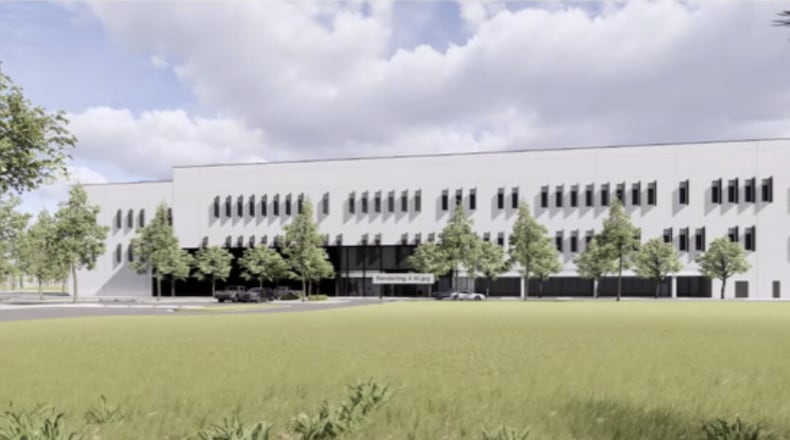One of the most profitable companies in the world will net some hefty tax savings in Fulton County while building another gigantic data center.
The Development Authority of Fulton County’s board voted 5-3 on Tuesday to approve $75 million in tax savings over a 10-year period for the project in Union City. The project on vacant land at 4810 Stonewall Tell Road is estimated to be valued at $1.8 billion and will be built by data center developer EdgeConnex.
Microsoft’s name wasn’t mentioned during the meeting, but the tech giant owns the land and confirmed to The Atlanta Journal-Constitution that it is the end user for the project.
So far this year, Microsoft has paid at least $171 million to acquire more than 480 acres across Atlanta’s southside for data center development, adding to a rush of computer server storage facilities that are being built across the region. A representative of the developer said topography challenges and the huge electricity usage taxes help justify the incentive.
Critics of DAFC cite the voracious demand for data centers as reason the authority should not offer tax breaks for them.
DAFC, also known as Develop Fulton, has faced intense scrutiny for doling out tax savings to developers in hot neighborhoods and for incentivizing data centers despite their proliferation in the Atlanta area. The board received an undisclosed number of public comments before Tuesday’s meeting, and board members indicated many of them were in opposition to granting the data center the requested tax break.
Those comments were not read during the meeting. Julian Bene, a former board member of Invest Atlanta, the city’s economic development arm, told the AJC that Microsoft should have to pay its full tax burden.
“Microsoft chose the site strategically, bought the site — for a price that reflects its topography — so it’s a fair bet they’ll develop the data center there without the tax break,” he said.
Todd Workman, an advisor for EdgeConnex, told the DAFC board that the tax savings were needed to level the playing field against three other sites under consideration. He said the project will be valued at $387 per square foot, which he said is 10 times more than other warehouse projects.
“There’s more investment put in a data center per square foot than pretty much any other kind of development,” Workman said. “... Property taxes are not a rounding error. They are a very front and center business expense for us.”
Credit: Courtesy Development Authority of Fulton County
Credit: Courtesy Development Authority of Fulton County
Data centers are large warehouses that store computer servers and are necessary infrastructure for digital file storage and artificial intelligence.
Union City Mayor Vince Williams spoke in favor of the project, saying it could be transformational for the city.
When asked whether the data center would be built on one of the other sites rather than Union City if the tax break was denied, Workman said a denial would be weighed heavily in the decision.
“I’m not going to say here a hard-and-fast no,” Workman said. “... but I will say that it is significant enough that if the answer is no, it’s going to move the needle in no uncertain terms.”
Credit: Courtesy Development Authority of Fulton County
Credit: Courtesy Development Authority of Fulton County
Redmond, Washington-based Microsoft reported $212 billion in sales revenue and a net income of $72.4 billion during fiscal year 2023, ranking 13th on the most recent Fortune 500 list. The company operates hundreds of data centers across the globe, including several in Fulton. In 2020, DAFC voted to approve tax breaks totaling about $32 million for Microsoft for a pair of data centers in the county.
Atlanta has emerged as a top market for these facilities. Since 2023, data center construction in metro Atlanta has increased 211%, which is the fastest among major data center markets across the country, according to real estate services firm CBRE.
The rush of data center development has sparked pushback from some communities and lawmakers over their strain on local utilities, consuming copious amounts of water and electricity. State regulators in April allowed Georgia Power to expand its electricity-generating capacity — mostly powered by fossil fuels — mainly because of data center projects in the pipeline across the state.
This year, state lawmakers passed a suspension of the state sales tax break program for certain large data centers. The bill’s sponsors said the incentive program isn’t giving the state much financial return on its multimillion-dollar investment. But Gov. Brian Kemp vetoed that measure earlier this month, saying a suspension would be abrupt, especially since the state Legislature two years ago extended the program until 2031.
DAFC estimates local governments will collect $198 million in taxes from the project over the next decade despite the potential tax abatement. DAFC earns fees off of the tax break deals it approves that fund its budget.
Mike Bodker, the board’s treasurer, argued that taxpayers will immediately benefit from the project.
“The community will benefit from day one, there’s no ifs, ands or buts about that,” he said. “The only person who couldn’t see it that way would be someone who believes that a similar project or a better project will come regardless, and I’m not that person.”
The board added a requirement that EdgeConnex finish building the full campus, which consists of three data center buildings, by 2032.
DAFC Chairman and state Sen. Brandon Beach, Vice Chairman Kwanza Hall and board members Erica Long and Mike Looney also voted in favor. Board members Kyle Lamont, Laura Kurlander-Nagel and Alvin Kendall voted no.
About the Author
Keep Reading
The Latest
Featured





